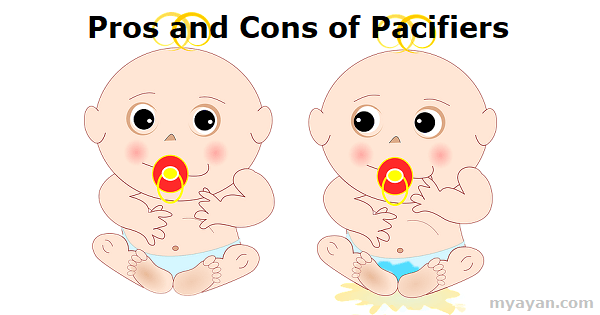Pacifiers, also known as soothers or dummies, have long been comforting for babies and parents alike. These small, nipple-like devices are designed to satisfy a baby's instinct to suck and provide comfort during fussiness or sleep. While pacifiers offer several potential benefits, they also come with drawbacks. In this discussion, we will explore the pros and cons of pacifiers, weighing their advantages against the potential concerns they raise. New or expecting mothers can easily assess both sides of the debate to stay aware of their use. Let’s start.
There are several reasons why pacifiers are popular. Some of the key advantages of Pacifiers include:
Pacifiers provide comfort and security to babies experiencing stress or anxiety due to changes in their environment or development stage. You can even use it as an effective tool to soothe your fussy baby.
Pacifiers are a great way to help babies settle and fall asleep. Pacifiers provide the comforting sensation of sucking that helps your baby relax, calming them down and helping them drift off into sleep. The rhythmic sucking can soothe an upset baby, providing comfort and a sense of security in the dark. Pacifiers also reduce crying, a common cause of sleep disruption for babies and their parents.
Research has shown that pacifier use can decrease an infant’s risk of SIDS by more than half. This protective effect has been attributed to many factors, including helping to maintain an open airway during sleep and stimulating the baby enough to wake up if their breathing becomes obstructed. Pacifiers may also help prevent infants from becoming overheated, which could lead to a higher risk of SIDS.
According to the Journal of Human Lactation, mothers who are at risk of postpartum depression and breastfeed their babies have the benefits of pacifiers. This is particularly beneficial for mothers who are easily agitated by infant crying. In this study, using pacifiers supports the emotional well-being of both the baby and the mother.
Pacifiers can also help relieve teething babies by providing a comforting and soothing sensation. The sucking motion of the pacifier helps the baby's gums to be numb, helping them feel more comfortable during this difficult period in their development. Additionally, pacifiers can be placed in the refrigerator before use, which further helps relieve tenderness in babies' gums due to cold stimulation.
As with any parenting decision, there are pros and cons associated with using pacifiers. Before giving your baby a pacifier, here are some potential issues you should consider.
Repeated pacifier use has been linked to an increased risk of ear infections in babies. This is because the pacifier can block the Eustachian tube, causing fluid buildup and infection.
Excessive pacifier use can also interfere with breastfeeding by reducing the frequency of baby feeding from the breast. If breastfeeding, it's important to wait until your baby is at least one month old before introducing them to a pacifier.
Like other sucking habits, such as thumb-sucking, extended pacifier use has been associated with dental issues like misaligned teeth.
Some research suggests that pacifier use may interfere with the development of language skills, as babies need to move their tongues and lips in different ways when using pacifiers compared to when they're babbling or speaking.
This is a rare occurrence, but some pacifiers have small parts that can come off and pose a choking hazard for your baby. It's important to check all pacifiers for signs of wear and tear before giving them to your child and replace them if necessary.
Conclusion
Pacifiers can be a valuable tool for soothing and comforting babies, providing benefits such as pain relief, self-soothing skills, and potentially reducing the risk of SIDS. They offer parents a means to alleviate their infants during fussy times or establish sleep routines. However, it is essential to consider the potential drawbacks of pacifier use, including dependency, dental issues, speech and language development concerns, and hygiene considerations. Parents should be mindful of when and how they introduce pacifiers and consider their baby's individual needs and development. Consulting with healthcare professionals or pediatricians can guide the appropriate use of pacifiers and help address any concerns. Ultimately, the decision to use pacifiers should be based on carefully assessing the potential benefits and drawbacks, keeping the baby's well-being and development in mind.

The American Academy of Pediatrics and the American Academy of Family Physicians suggest stopping pacifier use for infants in the second half of their first year to prevent ear infections. However, using pacifiers during the first six months is OK and may be helpful in that period.
Using pacifiers for your newborn is safe. The timing of when to introduce it depends on your baby and your preference. Some babies may do well with a pacifier right after birth, while others may need to wait a few weeks if they have difficulty breastfeeding.
Using a pacifier for a long time can lead to various issues, such as difficulties with breastfeeding, misaligned teeth, and ear infections. Dental problems may become apparent after the child is two years old but are more commonly seen after they turn four.
To avoid disrupting breastfeeding, it is recommended by the Mayo Clinic to wait until your newborn is 3 to 4 weeks old before introducing a pacifier. This allows enough time for your baby to establish a nursing routine.